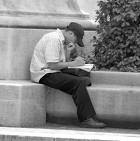
Many years ago, when my wife first saw
Gregeory Peck play
Atticus Finch in the movie version of
To Kill a Mockingbird, she decided he would be the ideal father. Finch is portrayed as honest, just, fair, understanding, and basically everything one could hope for in a father. In a recent
article in the
New Yorker,
Malcolm Gladwell looks at the character from a different angle.
In the novel, published 50 years ago, Atticus Finch, a lawyer in Alabama, defends a African American man falsely accused of raping a White woman. Though the attorney does an admirable for the defense, Gladwell notes that Finch does not express moral outrage or try to challenge the white supremacist Southern culture of the time. Gladwell writes that "Finch wants his white, male jurors to do the right thing. But as a good Jim Crow liberal he dare not challenge the foundations of their privilege. Instead, Finch does what lawyers for black men did in those days. He encourages them to swap one of their prejudices for another." This other prejudice was against a so-called "White trash" family, the Ewells, one of whom Bob Ewell is the main villain in the story.
While it is interesting to have a different point of view on one of the most esteemed characters in American fiction, Gladwell might be accused to being present-minded, that is taking today's political or social views and criticizing a character from half a century ago for not meeting our standards. Still, the article makes good reading.












